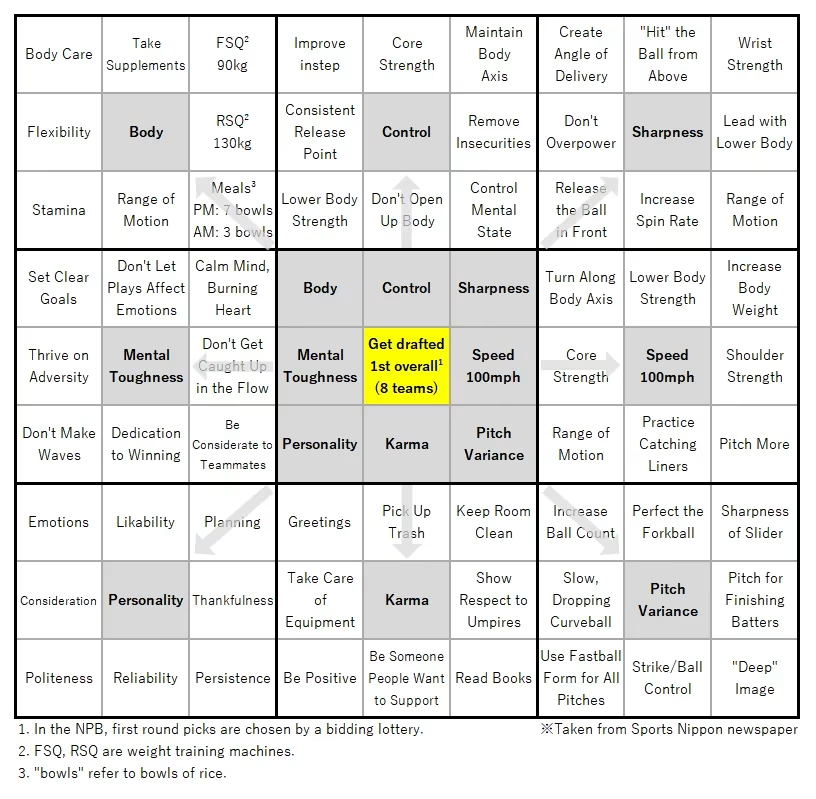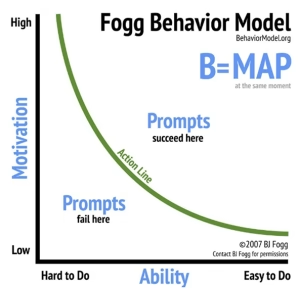As I look ahead to 2025, I have set a long-term goal to build a strong foundation of habits that will shape me into a person of greater virtue, compassion and sincerity. This journey of self-improvement was initially inspired by a video about Shohei Ohtani's High School Goal Sheet.

Shohei Ohtani's High School Goal Sheet. (Source)
His approach to setting goals fascinates me by going beyond developing hard skills for a baseball career, with a broader vision laid out about mental resilience, character growth, and something he beautifully called "good karma".
Due to various factors, including social pressures and social disparities, media and information often equate success with relentless competition. This environment promotes a survival-of-the-fittest mentality, making virtues such as as empathy, kindness, and forgiveness appear scarce and sometimes even viewed as signs of weakness. I have personally witnessed how such an outlook can lead to unwarranted suffering and depression. Fortunately, I have had the opportunity to meet some extraordinary individuals, friends whose genuine warmth and positivity have revealed to me an alternative way of living.
 Hero, Himmel from Frieren: Beyond Journey's End. (Art by 猫盒二三) | They remind me of Himmel, the gentle hero from Frieren: Beyond Journey’s End. His strength did not come from battlefield triumphs, but from his unshakeable kindness and ability to form authentic bonds with those around him. That’s the kind of heroism that I want to be involved in my biography. So, I decided to put together a plan to fix myself as a long-term project. The rest of the post will talk about the framework that I use and the positive impact so far. |
Framework to Become a Hero
If you know me, I am a lazy person. Although I have a passion from time to time. I’m not sure I can trust it. I will probably forget about it if I find it difficult to achieve. As such, I have been trying to look for tools that can let me chase my goals without drowning in excessive effort or misery. Better yet, I would love to find a way that is actually fun. In my search for the perfect shortcut, I came across a book called Tiny Habits by BJ Fogg. The introduction quote immediately hooked me: “If you cannot build a habit of doing something consistently, don’t blame yourself, blame the system.” Immediately I knew that this was my book.

Behaviour model theory by Fogg.
Fogg suggests that habit formation is based on three key elements: motivation, ability, and prompts. In my view, prompts play the most crucial role. A straightforward example is the push notification on a smartphone, which persistently nudges the user to engage with an app, thereby cultivating a habit of interaction. To consistently execute a specific action, effective prompts are necessary, such as setting reminders, alarms, or using an ongoing routine to cue a new habit. Motivation and ability are essential for designing habits. The underlying philosophy is elegantly simplistic: design habits that are so manageable that you would perform them even on your least motivated days, gradually enhancing your ability through the reinforcement of small successes.
Productivity and Mental Wellbeing
My productivity struggle is the first to get benefits from the framework. In my opinion, its biggest gift was helping me kick my mindless social media scrolling habit, the algorithm-fuelled brainrot that turns ten minutes into two hours of nothingness. I started small, setting my phone's social media apps to afternoon only and silenced every last notification. Over time, those wasted hours began to fill up with other activities, such as reading e-books, journaling, and gym. And the best part? I have now uninstalled most of those apps, especially Instagram, and have not spared them a second glance.
However, what caught me off guard was how cutting social networks not only freed up time, it also improved my overwhelmed of thoughts. Turns out, I am a very evil person, and scrolling through people's posts quietly fuelled jealousy and unease. That unconscious habit of comparing my life to others is a toxic trap in which I did not even know I was trapped. I don’t want to be that bitter person, and I am glad I took the right step forward to withdraw myself from that.
 Nobita from Doraemon. (Source) | Nobita from Doraemon always stood out as one of my favourite characters. Although he has his imperfections, he has a pure heart. He wishes happiness to others, rejoices in their successes, and shares in their grief. It’s traits like these that I wish I had, as they help him win over the person he cares most about. |
Emotional Control and People relations
Emotional control and desire control are the hardest things to master and would be an endless continuous study throughout my life. One of the book recommendations from PewDiePie had led me to pick up on philosophy, Stoicism to be specific, and though I am still working my way through by making them as a habit, the perspective it offers is valuable. Take, for example, road rage. I used to let every dumb driver light my fuse, but now? I am calmer behind the wheel, and it has made me a safer driver.
Besides that, I have also dived into some readings on dealing with people starting with the classic How to Win Friends and Influence People by Dale Carnegie, followed by Never Split the Difference by Christopher Voss. I'll admit this kind of self-help book are cringe sometimes which make me hesitated a lot before starting them. However, they are some really important values can be exacted throughout these books, treating people with genuinely sincerity and using actions to let them know that they their opinions are valued by others are my biggest take away from the books and is something I would like to adhere for the rest of my life.